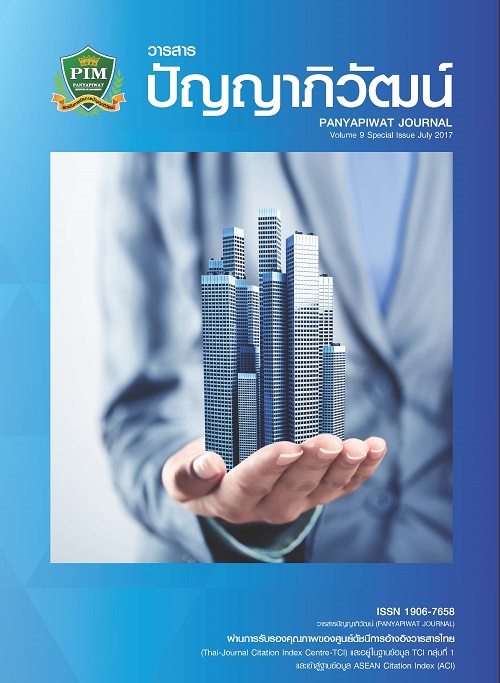อิทธิพลของอคติ การรับรู้ความเสี่ยง และอุปสรรค ต่อความตั้งใจที่จะเป็นผู้ประกอบการธุรกิจสร้างสรรค์ของนักศึกษาอาชีวศึกษาในเขตกรุงเทพมหานคร
Main Article Content
บทคัดย่อ
การวิจัยเชิงสำรวจโดยใช้เทคนิคการวิจัยแบบผสานวิธีครั้งนี้ ศึกษาอิทธิพลของปัจจัยอคติ การรับรู้ความเสี่ยง และอุปสรรคต่อความตั้งใจที่จะเป็นผู้ประกอบการธุรกิจสร้างสรรค์ของนักศึกษาอาชีวศึกษาในเขตกรุงเทพมหานคร โดยใช้แบบสอบถามเก็บข้อมูลจากกลุ่มตัวอย่าง จำนวน 400 ตัวอย่าง และใช้การสัมภาษณ์เชิงลึกเก็บข้อมูลจากลุ่มตัวอย่าง จำนวน 30 ตัวอย่าง พบว่า กลุ่มตัวอย่างส่วนใหญ่ตั้งใจที่จะเป็นผู้ประกอบการหลังจบการศึกษา มีตัวแปรอิสระ 4 ตัวแปร ที่มีความสัมพันธ์กับความตั้งใจที่จะเป็นผู้ประกอบการอย่างมีนัยสำคัญทางสถิติที่ระดับ .05 ประกอบด้วยตัวแปรการรับรู้การควบคุมพฤติกรรม การคล้อยตามกลุ่มอ้างอิง เจตคติต่อการเป็นผู้ประกอบการ และตัวแปรอุปสรรคของการเป็นผู้ประกอบการ ตัวแปรทั้ง 4 ดังกล่าวข้างต้น ส่งผลต่อการเปลี่ยนแปลงของความตั้งใจที่จะเป็นผู้ประกอบการธุรกิจสร้างสรรค์ ประมาณร้อยละ 70.60 ซึ่งถือเป็นระดับความสัมพันธ์ที่สูง รูปแบบของความสัมพันธ์ระหว่างตัวแปรอิสระและตัวแปรตามถูกเขียนขึ้นเป็นสมการตัวแบบของความสัมพันธ์ได้ ดังนี้ y = 0.234 + 0.519 รับรู้การควบคุมพฤติกรรม + 0.269 การคล้อยตามกลุ่มอ้างอิง + 0.334 เจตคติต่อการเป็นผู้ประกอบการ - 0.015 อุปสรรคของการเป็นผู้ประกอบการ
This mixed methods of survey research aimed at to study the impact of cognitive bias, risk perception, and obstacles perception to creative entrepreneurship intention of the vocational students in Bangkok Metropolitan, 400 samples were surveyed by questionnaire and In-depth interview were implemented with others 30 key-informant. It was found that most of samples had high intention to be the entrepreneurial after their graduated. There was a high correlation statistically significant at 0.05 levels of 4 dependent variables; behavior control, social norm, attitude toward entrepreneurial, and bias which impact 70.60% to the creative entrepreneur intention of vocational students in Bangkok Metropolitan. Those were created as a model as: y = 0.234 + 0.519 behavior control + 0.269 social norm + 0.334 attitude - 0.015bias
Article Details
“ข้าพเจ้าและผู้เขียนร่วม (ถ้ามี) ขอรับรองว่า บทความที่เสนอมานี้ยังไม่เคยได้รับการตีพิมพ์และไม่ได้อยู่ระหว่างกระบวนการพิจารณาลงตีพิมพ์ในวารสารหรือแหล่งเผยแพร่อื่นใด ข้าพเจ้าและผู้เขียนร่วมยอมรับหลักเกณฑ์การพิจารณาต้นฉบับ ทั้งยินยอมให้กองบรรณาธิการมีสิทธิ์พิจารณาและตรวจแก้ต้นฉบับได้ตามที่เห็นสมควร พร้อมนี้ขอมอบลิขสิทธิ์บทความที่ได้รับการตีพิมพ์ให้แก่สถาบันการจัดการปัญญาภิวัฒน์หากมีการฟ้องร้องเรื่องการละเมิดลิขสิทธิ์เกี่ยวกับภาพ กราฟ ข้อความส่วนใดส่วนหนึ่งและ/หรือข้อคิดเห็นที่ปรากฏในบทความข้าพเจ้าและผู้เขียนร่วมยินยอมรับผิดชอบแต่เพียงฝ่ายเดียว”
เอกสารอ้างอิง
Ajzen, I. & Fishbein, M. (1975). The influence of attitudes on behavior. In D. Albarracín, B. T. Johnson & M. P. Zanna (Eds), The Handbook of Attitudes. (pp. 173-222), Mahwah, New Jersey: Lawrence Erlbaum Associates.
Ajzen, I. (1991). The theory of planned behavior. Organizational Behavior and Human Decision Processes, 50(2), 179-211.
European Commission/EACEA/Eurydice. (2016). Entrepreneurship Education at School in Europe. Eurydice Report. Luxembourg: Publications Office of the European Union.
Fornell, C. & Larcker, D. F. (1981). Structural equation models with unobservable variables and measurement error: Algebra and statistics. Journal of marketing research, 18(3), 382-388.
Greene, P. G., Brush, C. G., Eisenman, E. J., Neck, H. M. & Perkins, S. (2015). Entrepreneurship Education: A Global Consideration from Practice to Policy Around the World. California: Sage Publications.
Hair, J. F. Jr., Hult, G. T. M., Ringle, C. M. & Sarsted, M. (2014). A primer on partial least squares structural equation modeling (PLS-SEM). California: SAGE Publications.
Heuer, A. & Liñán, F. (2013). Testing alternative measures of subjective norms in entrepreneurial intention models. International Journal of Entrepreneurship and Small Business, 19(1), 35-50.
Hmieleski, K. M. & Baron, R. A. (2008). When does entrepreneurial self-efficacy enhance versus reduce firm performance?. Strategic Entrepreneurship Journal, 2(1), 57-72.
Howkins J. (2001). The Creative Economy: How People Make Money from Ideas. London: Allen Lane.
Juthavichitr, K. (1998). Entrepreneurial potential and intention of Nakhon Pathom Rajabhat University students during the economic crisis of 2008. Nakhon Pathom: Nakhon Pathom Rajabhat University. [in Thai]
Kaplan, R. M. & Saccuzzo, D. P. (2005). Psychological testing: principles, applications, and issues. California: Thomson Wadsworth.
Kelley, D., Singer, S. & Herrington, M. (2016). Global Entrepreneurship Monitor 2015/16 Global report. London: London Business School.
Linan, F. & Chen, Y. W. (2009). Development and Cross-Cultural application of a specific instrument to measure entrepreneurial intentions. Entrepreneurship Theory and Practice, 33(3), 593-617.
Linan, F. & Rodriguez-Cohard, J. C. (2015). Assessing the stability of graduates’ entrepreneurial intention and exploring its predictive capacity. Academia Revista Latinoamericana de Administracion, 28(1), 77-98.
Ministry of Digital Economy and Society. (2016). Thailand digital economy and society development plan. Bangkok: Ministry of Digital Economy and Society. [in Thai]
Ministry of Industry. (2016). Thai industry development strategy 4.0 for 20 years plan. Bangkok: Ministry of Industry. [in Thai]
Nakayama, T. (2016). Entrepreneurial intention in Japan: an empirical study on Japan university students. IASET: International Journal of Business and General Management (IJBGM), 5(3), 2319-2267.
Office of college registration. (2016). Students enrollment statistic categorized by regions, provinces, and college types. The office of information and technology. Bangkok: Office of The Vocational Education Commission. [in Thai]
Office of the Academic. (2016). Thailand 4.0. Bangkok: The Secretariat of the House of Representatives. [in Thai]
Office of the national economic and social development board. (2016). The 12th National Economic and Social Development Plan 2017-2021. Bangkok: The Prime Minister’s Office All Rights Reserved. [in Thai]
Pongwiritthon, R. & Pakvipas, P. (2016). Guide for creative agriculture tourism activities development of highland community Mae Rim District, Chiang Mai Province: Rose Farms. Panyapiwat Journal, 8(1), 79-90. [in Thai]
Prasitratthasin, S. (2012). Research methodology for the Social Science. Bangkok: Samrada Printing. [in Thai]
Pratitas, P., Junrachub, N., Sivapatt, S., Treeakanukul, L., Boonrattanamitree, A., Pratitas, N. & Boonta, T. (2013). The development of democracy and participant political culturefor Thai Gen Z population. Bangkok: The Political Development Council Fund. [in Thai]
Pratitas, P., Srivarom, N. & Visetsri, V. (2013). The entrepreneurial competencies appraisal in preparing the students of King Mongkut’s University of Technology North Bangkok to enter AEC. Bangkok: King Mongkut’s University of Technology North Bangkok. [in Thai]
Shome, A. (2009). Singapore’s state-guide entrepreneurship: a model for transitional economies? New Zealand Journal of Asian Studies, 11(1), 318-36.
Sonmanee, K. (2016). Human resource management amid globalization. Panyapiwat Journal, 8(1), 275-287 [in Thai]
Spulber, D. F. (2014). The innovative entrepreneur. New York: Cambridge University Press.The Aspen Institute. (2008). Youth entrepreneurship education in America: a policymaker’s action guide. Washington DC: The Aspen Institute.
The UK quality code for higher education. (2012). Enterprise and entrepreneurship education: Guidance for UK higher education providers. UK: The Quality Assurance Agency for Higher Education 2012.
UNESCO/UNDP. (2013). Creative Economy Report 2013: widening local development pathways. New York: United Nations.
Vanichbuncha, K. (2002). Data analysis by SPSS for Windows. Bangkok: Thamasarn Press. [in Thai]
Wiratchai, N. (1999). LISREL model statistical analysis for research. Bangkok: Chulalongkorn University Press. [in Thai]
World Bank Group. (2016). Global economic prospects spillovers amid weak growth. Washington, DC.
The World Bank.
World Economic Forum. (2016). White paper: Factors for enabling the creative economy. Switzerland: World Economic Forum.
Yamane, T. (1967). Statistics: An introductory analysis. New York: Harper & Row.
Yotongyos, M. & Sukmaungma, S. (2016). Factors affecting entrepreneurial intention of undergraduate students: a case study of Bangkok University. Suthiparithat Journal, 20(95), 103-115. [in Thai]


